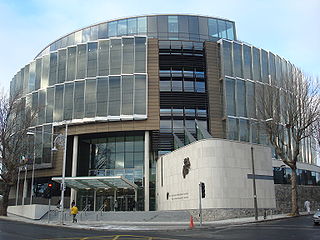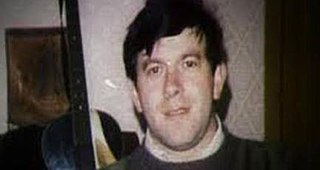Related Research Articles
In jurisprudence, double jeopardy is a procedural defence that prevents an accused person from being tried again on the same charges following an acquittal or conviction and in rare cases prosecutorial and/or judge misconduct in the same jurisdiction. Double jeopardy is a common concept in criminal law. In civil law, a similar concept is that of res judicata. Variation in common law countries is the peremptory plea, which may take the specific forms of autrefois acquit or autrefois convict. These doctrines appear to have originated in ancient Roman law, in the broader principle non bis in idem.
Jury nullification (US/UK), jury equity (UK), or a perverse verdict (UK) occurs when the jury in a criminal trial gives a not guilty verdict despite a defendant having clearly broken the law. The jury's reasons may include the belief that the law itself is unjust, that the prosecutor has misapplied the law in the defendant's case, that the punishment for breaking the law is too harsh, or general frustrations with the criminal justice system. Some juries have also refused to convict due to their own prejudices in favor of the defendant. Such verdicts are possible because a jury has an absolute right to return any verdict it chooses.
Trident Ploughshares is an activist anti-nuclear weapons group, founded in 1998 with the aim of "beating swords into ploughshares". This is specifically by attempting to disarm the UK Trident nuclear weapons system, in a non-violent manner. The original group consisted of six core activists, including Angie Zelter, founder of the non-violent Snowball Campaign.
Jury tampering is the crime of unduly attempting to influence the composition and/or decisions of a jury during the course of a trial. The means by which this crime could be perpetrated can include attempting to discredit potential jurors to ensure they will not be selected for duty. Once selected, jurors could be bribed or intimidated to act in a certain manner on duty. It could also involve making unauthorized contact with them for the purpose of introducing prohibited outside information and then arguing for a mistrial. In the United States, people have also been charged with jury tampering for handing out pamphlets and flyers indicating that jurors have certain rights and obligations, including an obligation to vote their conscience notwithstanding the instructions they are given by the judge.

The Special Criminal Court is a juryless criminal court in Ireland which tries terrorism and serious organised crime cases.

In law, a trial is a coming together of parties to a dispute, to present information in a tribunal, a formal setting with the authority to adjudicate claims or disputes. One form of tribunal is a court. The tribunal, which may occur before a judge, jury, or other designated trier of fact, aims to achieve a resolution to their dispute.
Ciaron O'Reilly is an Australian anti-war campaigner, peace protester, social justice campaigner and Catholic Worker, having been "engaged in ... protests, acts of civil disobedience and trials in England, Ireland, and his native Australia." He has also become one of the most visible and active practical and theoretical exponents of the ideas of Christian anarchism, arguing that this "'is not an attempt to synthesise two systems of thought' that are hopelessly incompatible, but rather 'a realisation that the premise of anarchism is inherent in Christianity and the message of the Gospels.'"
Clare Grady is an American peace activist and a member of the Catholic Worker and the Plowshares movements. She advocated against use of cruise missiles for first-strike capability in the 1983 Griffiss Plowshares action. In the process of the protest, military equipment was damaged and splattered with blood. In 2003, she and three others made up The Saint Patrick's Day Four, who conducted a protest action at a military recruiting center in Lansing, New York against the impending Iraq War. She participated in the Kings Bay Plowshares action on April 4, 2018, which resulted in a conviction and sentence of one year and a day.
On 14 October 2004, Pádraig Nally, an Irish farmer living in County Mayo, Republic of Ireland shot dead Irish Traveller John "Frog" Ward, who had been trespassing on his property. In November 2005 Nally was sentenced to six years' imprisonment for manslaughter. His conviction was quashed in October 2006 and, after a retrial in December 2006, he was found not guilty of manslaughter.
Goretti Horgan is an Irish socialist activist and a lecturer in social policy at the Ulster University in Northern Ireland.
Colm Murphy is an Irish republican who was the first person to be convicted in connection with the Omagh bombing, but whose conviction was overturned on appeal. While awaiting a retrial on criminal charges, Murphy was found liable for the bombing in a civil trial, along with Michael McKevitt, Liam Campbell and Seamus Daly. He was subsequently cleared of criminal charges in February 2010.
R v Saibene and others was an English trial of seven of the "Smash EDO" campaign. On 16–17 January 2009 the activists broke into the armaments factory-office in Moulsecoomb and damaged equipment worth around £200,000. They were cleared by the jury of conspiring to cause and causing criminal damage. The jury accepted their defence that they were acting with lawful excuse by aiming to prevent Israeli war crimes during the 2009 Gaza War.
The 2005 Sydney terrorism plot concerned a group of five men arrested in 2005 on charges of planning an act of terrorism targeting Sydney, Australia's most populous city and the capital of New South Wales. The group was found guilty on 16 October 2009 and were sentenced on 15 February 2010 for terms up to 28 years.
Nora Wall is a former Irish sister of the Sisters of Mercy who was wrongfully convicted of rape in June 1999, and served four days of a life sentence in July 1999, before her conviction was quashed. She was officially declared the victim of a miscarriage of justice in December 2005. The wrongful conviction was based on false allegations by two women in their 20s, Regina Walsh and Patricia Phelan. Walsh had a psychiatric history and Phelan had a history of making false allegations of rape prior to the event. Phelan subsequently admitted to having lied.
Linda and Charlotte Mulhall are sisters from Dublin, Ireland, who killed and dismembered their mother's boyfriend, Farah Swaleh Noor, in March 2005. Noor was killed with a Stanley knife wielded by Charlotte and struck with a hammer by Linda following a confrontation with the sisters and their mother, Kathleen Mulhall. His head and penis were sliced off and the rest of his corpse dismembered and dumped in the Royal Canal in Dublin where a piece of leg still wearing a sock was spotted floating near Croke Park ten days later.

Shane Geoghegan was an Irish rugby player for Garryowen who was shot and killed in a case of mistaken identity as part of a gang feud in Dooradoyle, a suburb in the city of Limerick, Ireland. The murder took place in the early hours of Sunday morning, 9 November 2008. He had no links with organised crime gangs.
Juror misconduct is when the law of the court is violated by a member of the jury while a court case is in progression or after it has reached a verdict.

Declan Flynn was an Irish gay man attacked and killed in Fairview Park in Dublin. His murder is seen as the catalyst for the LGBTQ Pride movement in Ireland. His death came about as a result of a series of beatings meted out to gay men in Dublin who used Fairview Park as a meeting place at the time.
Paul Anthony McDermott, SC was an English-born Irish lawyer and academic. He was a prominent criminal barrister who often prosecuted cases in the Irish superior courts. He was also known as a lecturer in law at University College Dublin and for frequent commentary on legal matters in the Irish media.
Carmel Stewart is an Irish lawyer who has been a Judge of the High Court since 2014. She was previously a barrister and a Judge of the Circuit Court between 2012 and 2014.
References
- ↑ "They’re Always After Me Lucky Charms!" CitizenSailor Blog post with pictures of the incident
- ↑ Press Statement, Catholic Worker, 11 Feb 2003
- 1 2 "Five go on trial on US plane damage charges". RTÉ News. 8 March 2005. Retrieved 1 November 2011.
- ↑ Trial of anti-war protesters collapses, RTÉ News, 14 March 2005
- ↑ Jury discharged in anti-war case, RTÉ News, 7 November 2005
- ↑ Five not guilty of damaging US plane, RTÉ News, 25 July 2006
- ↑ Browne, Harry (2008). Hammered by the Irish: how the Pitstop Ploughshares disabled an un-armed U.S. transport aircraft, with Ireland's blessing. Petrolia, California, Edinburgh, Oakland, California: AK Press and CounterPunch. ISBN 978-1-904859-90-1. OCLC 267235787.
Sometimes you just have to do the right thing.